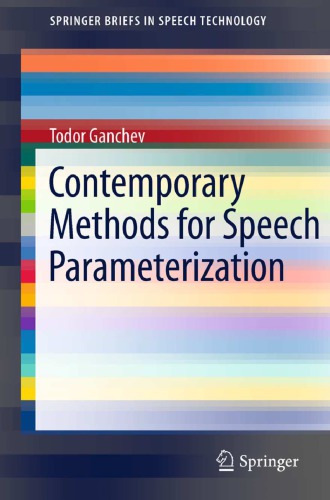

Most ebook files are in PDF format, so you can easily read them using various software such as Foxit Reader or directly on the Google Chrome browser.
Some ebook files are released by publishers in other formats such as .awz, .mobi, .epub, .fb2, etc. You may need to install specific software to read these formats on mobile/PC, such as Calibre.
Please read the tutorial at this link: https://ebookbell.com/faq
We offer FREE conversion to the popular formats you request; however, this may take some time. Therefore, right after payment, please email us, and we will try to provide the service as quickly as possible.
For some exceptional file formats or broken links (if any), please refrain from opening any disputes. Instead, email us first, and we will try to assist within a maximum of 6 hours.
EbookBell Team

5.0
68 reviewsContemporary Methods for Speech Parameterizationoffers a general view of short-time cepstrum-based speech parameterization and provides a common ground for further in-depth studies on the subject. Specifically, it offers a comprehensive description, comparative analysis, and empirical performance evaluation of eleven contemporary speech parameterization methods, which compute short-time cepstrum-based speech features.
Among these are five discrete wavelet packet transform (DWPT)-based, six discrete Fourier transform (DFT)-based speech features and some of their variants which have been used on the speech recognition, speaker recognition, and other related speech processing tasks. The main similarities and differences in their computation are discussed and empirical results from performance evaluation in common experimental conditions are presented. The recognition accuracy obtained on the monophone recognition, continuous speech recognition and speaker recognition tasks is contrasted against the one obtained for the well-known and widely used Mel Frequency Cepstral Coefficients (MFCC).
It is shown that many of these methods lead to speech features that do offer competitive performance on a certain speech processing setup when compared to the venerable MFCC. The last does not target the promotion of certain speech features but instead aims to enhance the common understanding about the advantages and disadvantages of the various speech parameterization techniques available today and to provide the basis for selection of an appropriate speech parameterization in each particular case.